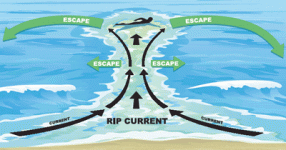eathabs
Bronze Member
- Joined
- Jan 11, 2005
- Messages
- 1,103
- Reaction score
- 41
- Golden Thread
- 0
- Location
- Sunbury, PA
- Detector(s) used
- DFX 300, Classic ID
- Primary Interest:
- All Treasure Hunting
After responding to NJcigarman's post this morning I thought that it might be wise to bring this to the forefront so that everyone at least sees the title. So many people die each year because they simply don't realize that swimming parallel to the beach will get you out of a rip current. Too many people also don't respect the shear power that a breaking wave has and as a result could be knocked down and dragged out to sea. On an almost daily basis we see forum members who are new to water hunting and may also be new to the beach. I have seen people get smoked by 2 foot waves that were breaking on the beach because they have no clue what they are doing in/at the ocean on their annual vacation. Typically those same tourists are the ones that get caught in rip currents.
Here is the link I posted earlier. If you and or your loved ones don't know how to escape a rip current please take a few minutes to check it out. Your life could depend on it!!
Surviving a Rip Current
and a video
habs
Here is the link I posted earlier. If you and or your loved ones don't know how to escape a rip current please take a few minutes to check it out. Your life could depend on it!!
Surviving a Rip Current
and a video
habs
Amazon Forum Fav 👍
Upvote
0




